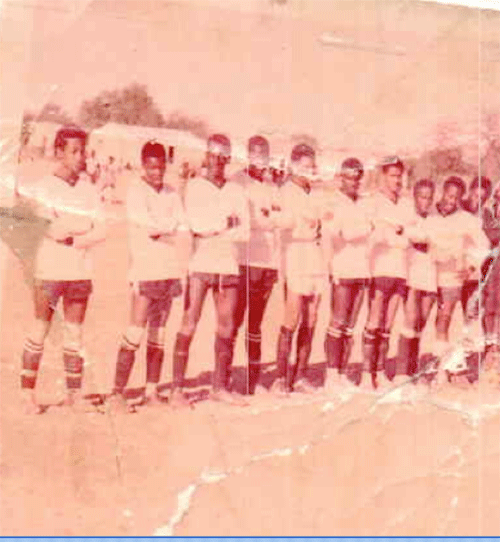Located approximately 185 km north-east of Okahandja, the village of Okatupapa, in the heart of the vastly-populated Otjozondjupa region, is home to this author and is the place where few noted personalities have spent a significant chunk of their formative years.
In case you did not know, the likes of Oscar Mengo, the late Dale Stephanus, Solomo ‘Gazza’ Hei, Namene Fillemon, Fares Kamupingene, Robinson Iyambo, Onesmus Mazumo Hukununa (Eddy Louis’ old man and Lorenzo Louis’ grandfather), as well as noted academic Dr Bernie Zaaruka, to mention but a few, are all products of this unique multi-cultural village.
Apart from the above-mentioned personalities, the village was also home to former Black Beauty Chiefs (BBC) and Okahandja Mannschaft Football Club hard-tackling defender, the late Mannfredt Maatu Tjenda, famously known as the ‘Suricate Mongoose’ in his vast circle of football friends.
By popular demand, New Era Sport takes you, our esteemed reader, through the untold football journey of this tallish raw village boy, who only resurfaced in the Garden Town (Okahandja) with no other intention but to seek employment.
Born on 9 September 1952 at Okahandja, the gangling defender grew up at Okatupapa village where the game of football was taboo, let alone any other recreational activities, apart from riding donkeys and the sporadic engagement in illegal hunting of wild animals to supplement his family’s daily diet of pap (porridge) and sour milk (omaere).
Whereas his newly-found friends in the Garden Town were already exposed to street football, the defender did not need a second invitation to master the trade as he quickly hit the ground running.
Being an amazing fast learner that he was, Tjenda quickly acquired the required skills of how to trap a ball, shooting and heading techniques, as well as the art of accurate passing and also tightly marking dangerous strikers.
He joined local team Black Beauty Chiefs (BBC), a predominantly Ovaherero-speaking football entity, where he was to be reunited with homeboy, the great Oscar Mengo.
The new kid on the block was to form the spine of the black and white strip outfit’s rearguard, alongside veteran fullback Binga Kairikove, fellow villager Urbanus Vetjiituavi Tjipu Kaputjaza and Petrus ‘Slow Poison’ Sylvanus, in that sequence.
A fearless tackler and great header of the ball, the beanpole rookie defender cemented himself as a vital cog in the team’s starting line-up. BBC was amongst the leading teams in the football-crazy Nau-Aib residential area, competing fiercely against the likes of Spoilers, Battle Boys and Magic Tigers football clubs.
In the conspicuous absence of organised league structures at the town, clubs would always engage in fiercely-contested exhibition matches on weekends for tribal supremacy, exchanging opponents on Saturdays and Sundays on a regular basis in the annual Municipality Cup, which was the only highlight of the calendar year.
Local teams also often welcomed other clubs from neigbouring Windhoek, Omaruru and Karibib for a few exhibition matches on weekends, and firmly stood their ground against their more celebrated opponents, to the extent that teams from Windhoek made Okahandja their happy hunting ground for the recruitment of raw talents.
Katutura glamour football club African Stars became chief beneficiaries, luring the likes of Oscar Mengo, Doc Naobeb, George Gariseb, Ace Tjirera, Merino Kandonga, Lemmy Goagoseb, Albert Tjihero, Hasie Mingeri, Ishmael ‘Zambia’ Tsutsai Khoeseb, Edu Garugub, Jamanuka and Bimbo Tjihero, Norii Kaanjuka, all to their nest.
On a rather un-cool note, BBC were also founder members of the profoundly upsetting tribal tournament, the annual Chief Hosea Kutako Cup, featuring football teams of Ovaherero descent only.
The northern town of Otjiwarongo was the chosen venue for the somewhat short-lived annual tourney, hosted by Life Fighters.
Participating teams were Poison Arrows (Grootfontein), Red Bees (Tsumeb), African Stars (Otavi), Scorpions/African Lions (Omaruru), Sunshine (Gobabis), Okaondeka Aces (Okakarara), BBC (Okahandja), African Stars/Flames (Katutura/Windhoek).
However, a significant number of the team’s playing personnel jumped ship in search of greener pastures in Windhoek and Walvis Bay, respectively.
Notwithstanding the naked reality that some of the club’s stalwarts were starting to get a bit long in the tooth, the squad was left wanting in terms of strengths, and the club eventually died an unavoidable natural death.
Coincidentally, the team’s demise occurred at the same time as the inevitable introduction of multi-racial football in Apartheid South West Africa (SWA) in 1977.
As it turned out, Tjenda was one of few chosen black players invited to add colour to the only white team in Okahandja, alongside Spoilers’ midfield maestro Benjamin ‘Doc’ Naobeb and a few selected coloured players from Veddersdal.
Unfortunately, the gangling no-nonsense defender’s blossoming football career came to an abrupt end when a bad clash of heads with an opposition player curtailed his progress, ultimately dimming any further interest in playing competitive football for that matter.
Nonetheless, he made a surprise comeback, and would occasionally feature for his village team #Naire Eleven during the popular festive season knockout tournaments.
Off the field, Tjenda escaped death by the skin of his teeth when he was kidnapped and robbed at gunpoint while navigating a jumbo truck transporting goods to South Africa.
He was stripped of all his personal belongings, including cash, and brutally relieved of the truck and its entire cargo. He was subsequently tied to a tree for wild animals to feed on, but by the grace of the Almighty, the tough-as-steak boy from #Naire was miraculously found unscathed by God-sent passers-by who freed him, before escorting him safely to the nearest police station to narrate his unpleasant ordeal.
Sadly, the likeable defender lost a hard-fought battle against illness in his hometown of Okahandja in April 2004. He was laid to rest at the family’s traditional final resting place at Okondjatu. May his gentle soul continue to rest in power.



